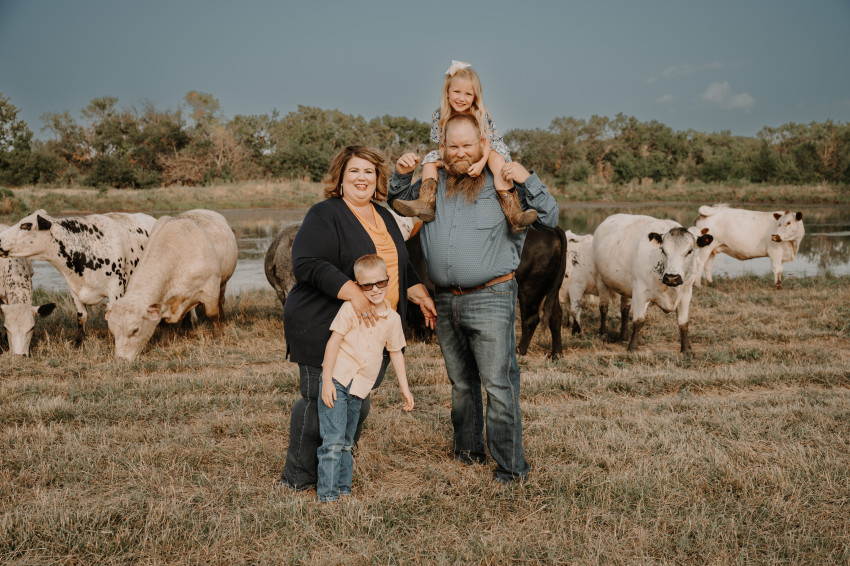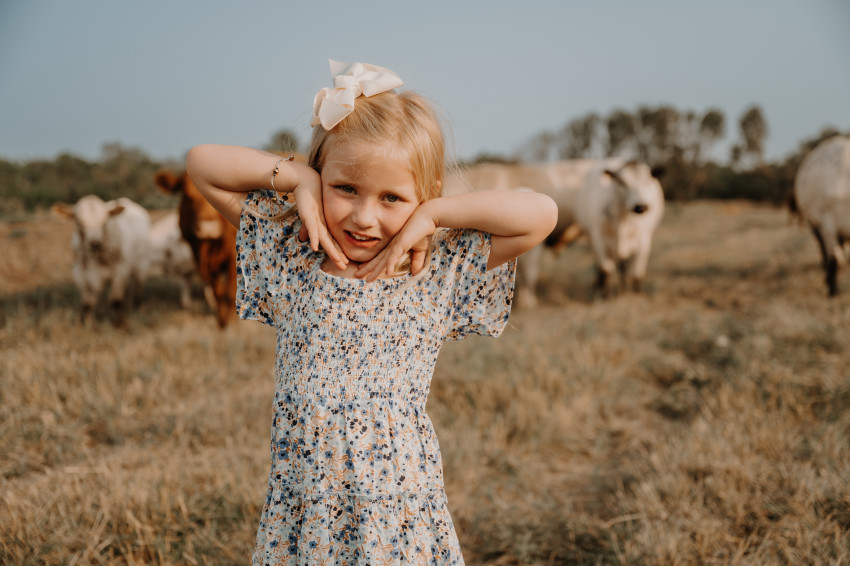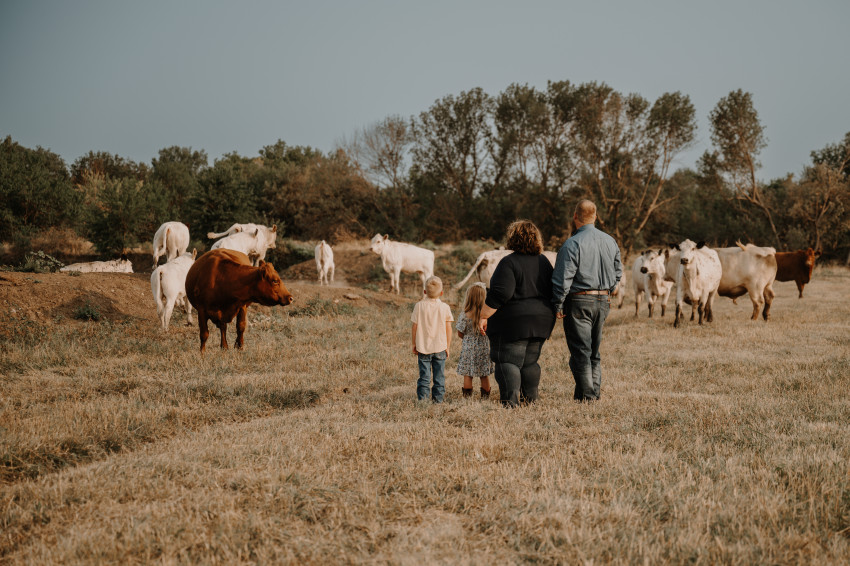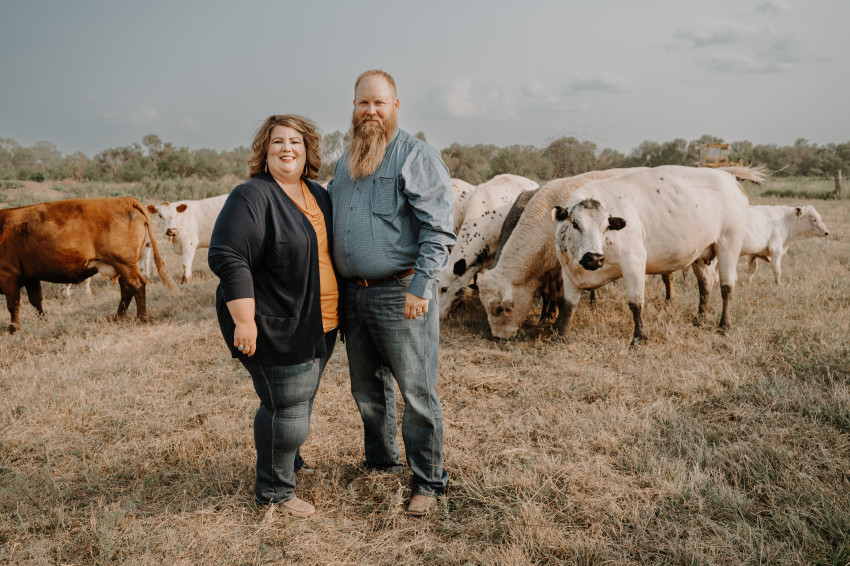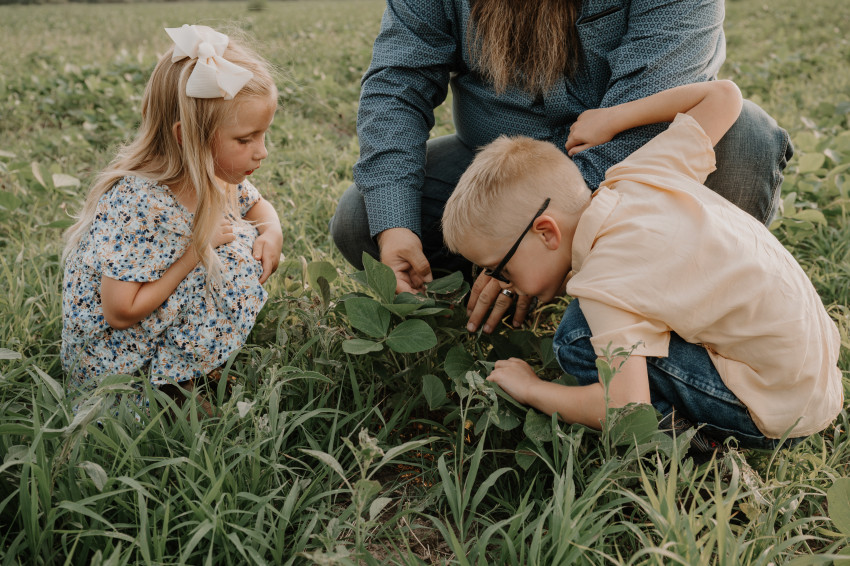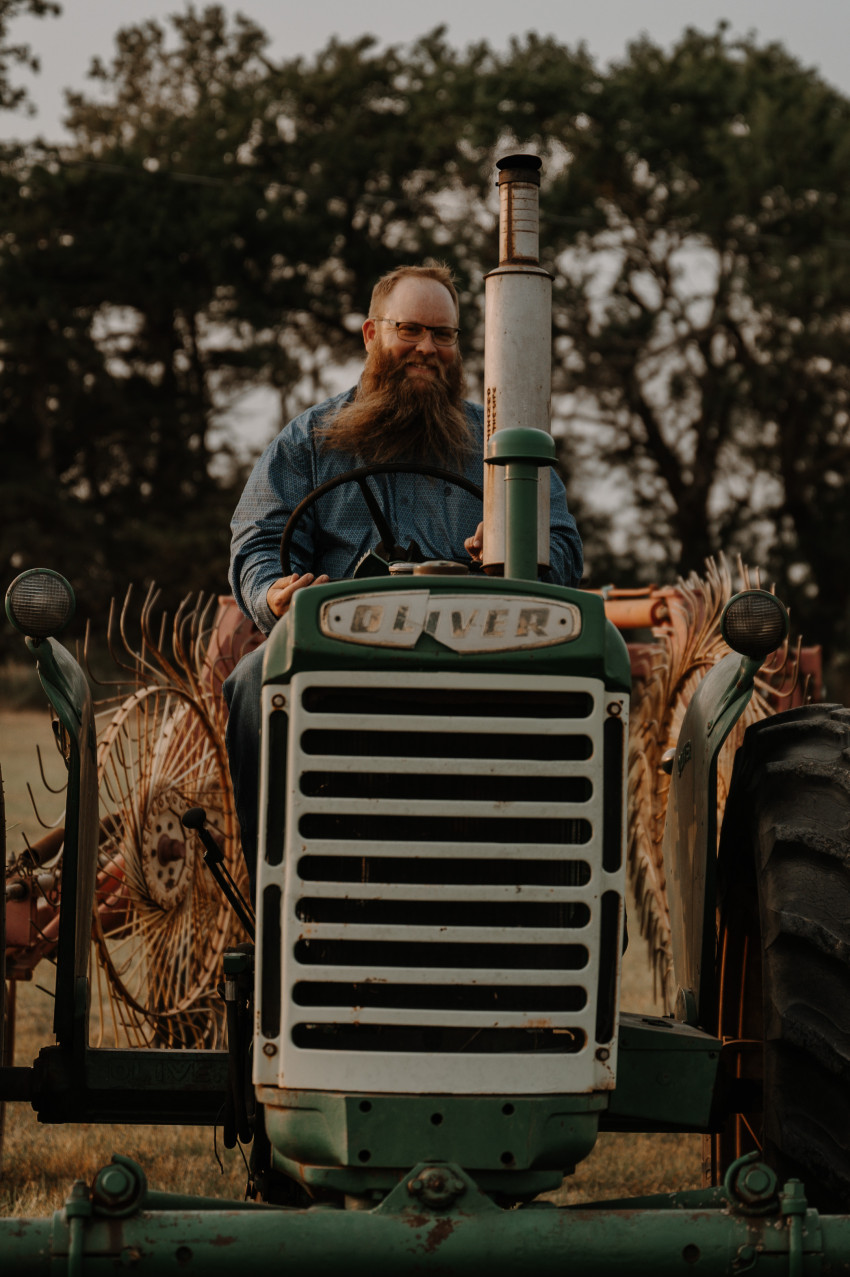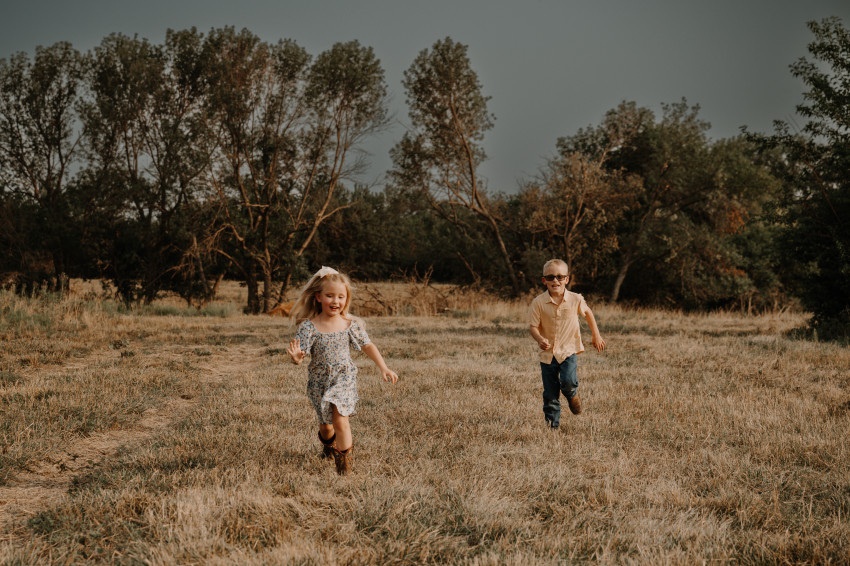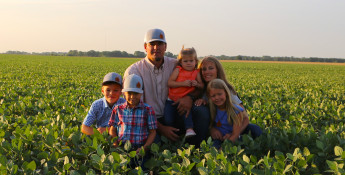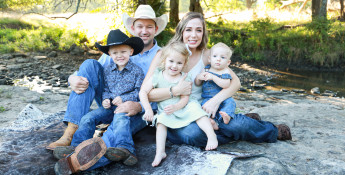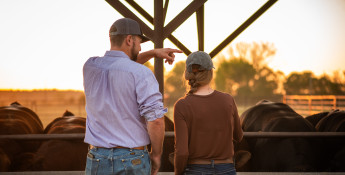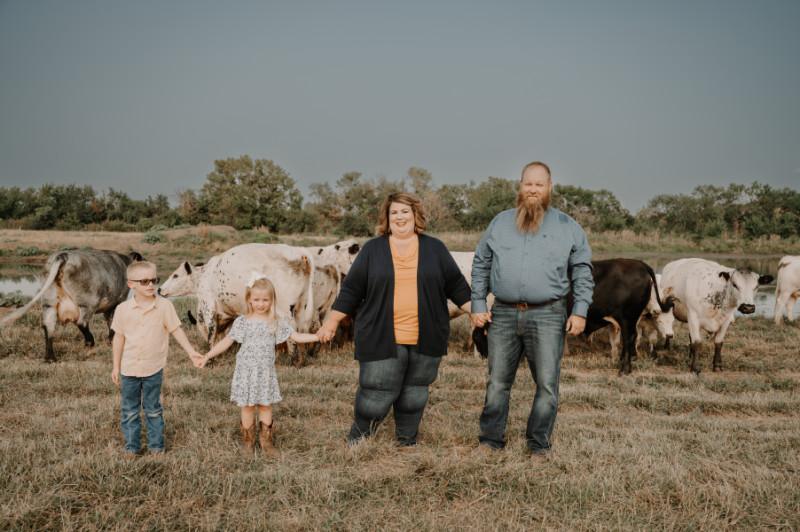By Kansas Living on July 30, 2025
Meet the Crawshaw Farm Family
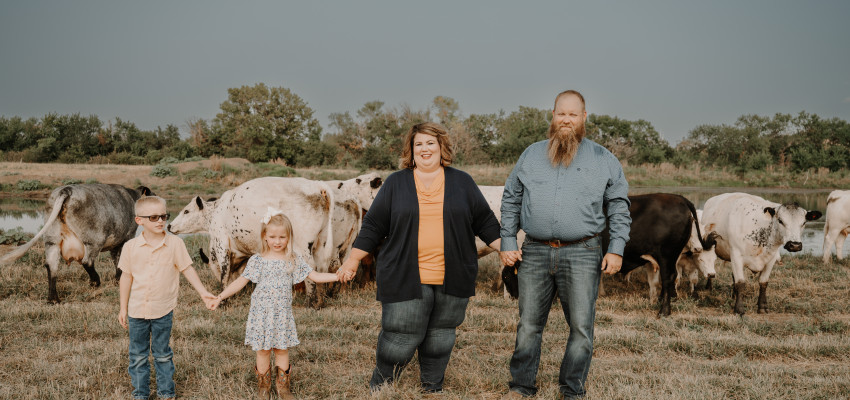
Alfred and Taylor Crawshaw raise British White and British cross cattle outside Altoona. They primarily grow row crops (corn and soybeans) in partnership with Alfred's father, Vern. Alfred attended Kansas State University, earning a degree in animal science. Taylor grew up outside Coffeyville and attended Missouri State University, earning a degree in psychology with a minor in child and family development. She later earned a Master of Science in educational leadership and is currently enrolled in a doctoral program at Baker University. Alfred and Taylor have two children, Henry and Harlow. Learn more about this family.
What made you want to become farmers and ranchers?
We love the rural way of life, working hard to complete projects and the innovation and new ideas we can constantly dream about. Caring for the land and animals is a huge responsibility, and we both enjoy strategy and development.
How do you teach your kids about farming/ranching and the value of hard work?
Henry and Harlow are always with us. They have learned alongside us, and each enjoys different aspects of farming/ranching. Henry will help work ground and harvest all day with little complaint. Harlow would rather feed animals and help vaccinate the calves. They understand working together as a team is important and are always willing to share their ideas about how a project should be completed. Conveying teamwork and the ability to communicate are very important to us.
What does fall look like on your operation?
We tend to find balance in the seasons, probably because every season brings new challenges, new preparations and comfort. We are usually weaning calves, harvesting, attending football games and not doing dishes in the house. Every season is in preparation for what's coming next.
How do you handle extreme weather - droughts, floods, blizzards, etc?
In southeast Kansas, we aren’t used to hauling water to our pastured cattle. In recent years, we have opened wells and hauled water for the first time in our lifetimes. Alfred doesn’t stress about much in terms of flooding or blizzards, but this most recent drought has been hard. I go back to balance — everything has a season, and sometimes you just hunker down and work to wait it out.
This may mean culling, which means carefully selecting a few more heifers to leave the herd or not keeping those bulls;
it may mean minimal growth for a few years until things settle down.
We learned about extremes and patience in the NICU with Henry. Nothing is forever, and sometimes having patience, praying and doing what science says is best is all you can do.
How do you care for your animals?
We believe in handling our animals in the most stress-free way possible. We interact with them more in the mornings and evenings in the summer and try to coax them into the catch pen instead of driving them. When we work and wean the calves, we try to maintain a calm, quiet atmosphere to keep from adding more stress to what's already a stressful time for them.
When it's just Alfred and Vern working cattle, there is very little talking — they just move and anticipate. When Henry, Harlow and I join, we are much more chatty but try to maintain the same calm atmosphere.
What three things matter the most to you as a farmer/rancher?
Community, family and individualism - not every operation is or should be the same.
What is the hardest and best part of your job as a farmer and rancher?
Caring for animals is a huge responsibility. It's rewarding to see things cared for and skipping through the pasture. It's very hard, though, when an animal is sick.
What methods do you utilize to protect the environment?
We make sure to follow all labels and guidelines of the various chemicals and medicines we use to ensure we have no negative impact on the environment. We no-till when we can, but some of our ground needs the organic material incorporated back into the soil.
What does a typical week/month look like for you?
Our calendars are busy! I sit down weekly with my mom, who helps us homeschool Henry and Harlow, to review our calendars. Alfred and I have a big wall calendar in addition to our digital calendar reminders. In any given week, we usually have one or two board or community organization meetings, dance, tumbling, an ICC event and our work at the farm. Alfred and Vern usually sit down to visit about their days on weekday mornings and we just try to fit it all in! Alfred and Vern are low-maintenance. When we were first married, I worried more about field meals or water, but they take care of themselves. They think it's weird if I pack them anything. However, when Henry and Harlow are with them, they are very grateful for a snack bag and drinks.
What's one thing you've changed on your operation since you started?
In the past, we repaired most things ourselves. This sometimes took more time. Now we try to balance the use of a mechanic or tire shop with our time and money.
What is one thing you wish grocery buyers knew about your operation?
We care for everything we raise, whether it's calves or crops. For us, not everything is about profit.
What would you do if you weren't a farmer and rancher?
Taylor would be in agricultural sales or agricultural communications of some sort, but also really enjoys teaching and development.
Alfred would probably be a pilot ferrying people into the backcountry of Alaska.
What is your family's favorite protein?
Our most used protein is beef. We have tacos and sloppy joes a lot. Our favorite protein might be seafood. We love a good shrimp or crawfish boil, and yes, we cook it in a pot in the yard.
Where do you see the future of your operation going?
I am looking forward to Henry and Harlow being able to take on more responsibilities as they get older and mature. With Taylor's focus on communication, Henry and Harlow have already started to impact the farm and ranch with their own ideas. We are always looking for ways to diversify and are open to those opportunities as they present themselves.

